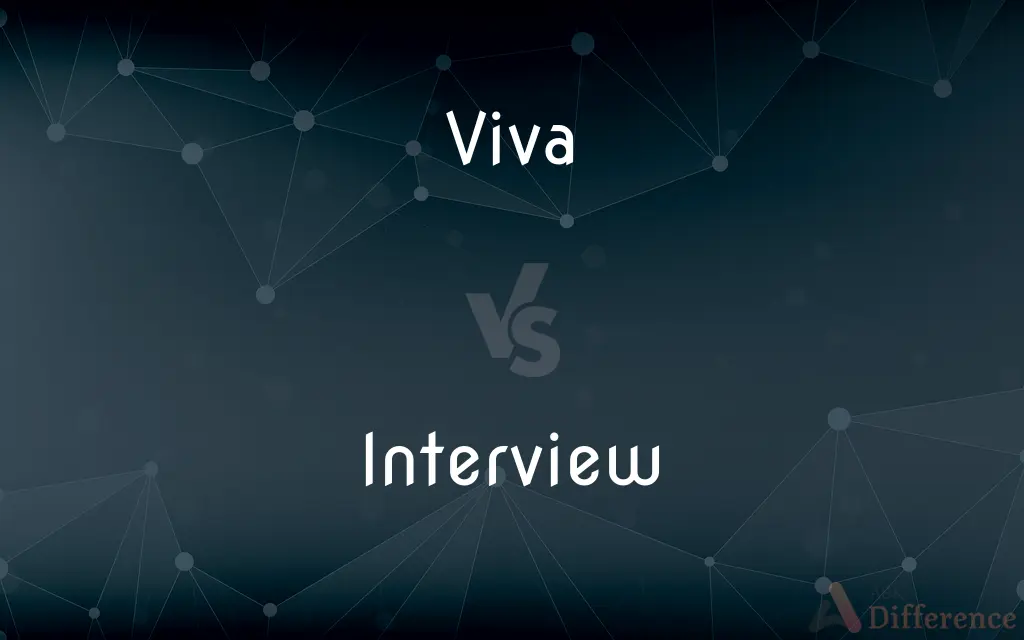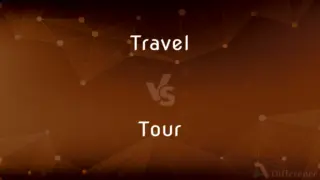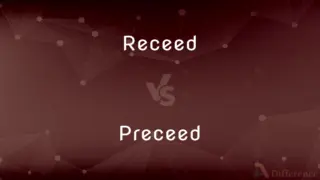Viva vs. Interview — What's the Difference?
By Tayyaba Rehman & Fiza Rafique — Updated on March 10, 2024
Viva, short for viva voce, is an oral examination, typically for academic purposes, while an interview is a formal meeting to assess qualifications or gather information.

Difference Between Viva and Interview
Table of Contents
ADVERTISEMENT
Key Differences
A viva, often a critical part of a student's academic assessment, involves a detailed oral examination of a written thesis or dissertation. It's a platform where examiners engage with the candidate to discuss their work, understand their understanding, and assess their depth of knowledge on the subject. In contrast, an interview is a broader concept that includes any meeting where one party asks questions to evaluate the other's suitability for a job, role, project, or for informational purposes.
Vivas are primarily academic in nature, focusing on scholarly works, research findings, and theoretical knowledge, allowing candidates to defend their thesis and answer questions related to their research. On the other hand, interviews can occur in various contexts, including but not limited to employment, admissions, and media, with questions that may assess professional skills, personal attributes, and suitability for a position or role.
In a viva, the atmosphere is usually formal and academic, with a focus on rigorous scrutiny of the candidate's research. The panel typically consists of experts or academics who are well-versed in the subject matter. Conversely, interviews can range from formal to relatively informal, depending on the context, and the interviewer(s) may not always be specialists in the interviewee's field of expertise.
The outcome of a viva significantly impacts a student's academic career, determining their qualification for a degree or doctorate based on their ability to articulate and defend their research. Interviews, however, generally lead to decisions about employment, selection for roles, or the gathering of information, with varying degrees of impact on the interviewee's career or objectives.
While both vivas and interviews involve question-and-answer formats, the nature and purpose of these questions differ greatly. Vivas focus on academic rigor and mastery of a specific subject area, whereas interviews aim to assess a broader range of qualifications, from technical skills and experience to personality and cultural fit within an organization or context.
ADVERTISEMENT
Comparison Chart
Definition
An oral examination of a written thesis or work.
A formal meeting for assessment or information gathering.
Context
Academic, for assessing scholarly work.
Employment, admissions, media, etc.
Purpose
To defend a thesis and demonstrate subject mastery.
To evaluate suitability for a position, role, or to gather information.
Atmosphere
Formal and academic.
Can range from formal to informal.
Participants
Examiners and candidate, usually academics.
Interviewer(s) and interviewee, not limited to academics.
Outcome
Determines academic qualification.
Leads to employment, selection, or informational conclusions.
Focus
Research findings, theoretical knowledge.
Skills, experience, personality, suitability.
Compare with Definitions
Viva
Academic defense of research work.
His viva on climate change models was challenging.
Interview
Assessment of a candidate's qualifications.
The interview process for the role was rigorous.
Viva
Dialogue between student and examiners on a thesis.
The viva examined every aspect of her dissertation.
Interview
A step in the hiring or admission process.
After the interview, she felt confident about her admission chances.
Viva
An oral exam to assess the depth of understanding of one's thesis.
She prepared for her viva to defend her PhD thesis.
Interview
Dialogue to understand personality and skills.
The interview questions tested both his technical knowledge and soft skills.
Viva
A critical part of PhD completion.
Passing the viva was the final step to his doctorate.
Interview
Formal conversation for information exchange.
The journalist's interview with the mayor shed light on the policy.
Viva
Assessment of thesis validity and originality.
The viva focused on the originality of his arguments.
Interview
A meeting to assess job suitability.
She aced the interview and got the job offer.
Viva
An examination conducted by word of mouth
Interview
An interview is essentially a structured conversation where one participant asks questions, and the other provides answers. In common parlance, the word "interview" refers to a one-on-one conversation between an interviewer and an interviewee.
Viva
Short for viva voce
Interview
A meeting of people face to face, especially for consultation.
Viva
A cry of ‘viva’ as a salute or cheer
The vivas of the crowd greeted the ship as it returned to port
Interview
Hold an interview with (someone)
She was interviewed by a reporter from the Daily News
Police are keen to interview two men seen nearby
Viva
Subject (someone) to an oral examination
Facing them sat the youth who was being vivaed
Interview
A formal meeting in person, especially one arranged for the assessment of the qualifications of an applicant.
Viva
Long live! (used to express acclaim or support for a specified person or thing)
‘Viva Mexico!’
Interview
A conversation, such as one conducted by a reporter, in which facts or statements are elicited from another.
Viva
Used to express acclamation, salute, or applause.
Interview
An account or a reproduction of such a conversation.
Viva
Long live ... ! (used to express acclaim or support).
Interview
(Informal) An interviewee
An actor who was a tough interview.
Viva
To cheer, applaud
Interview
To obtain an interview from.
Viva
(transitive) To subject to an examination of this kind.
Interview
To have an interview
Interviewed with a publishing company.
Viva
A shout of applause.
Interview
(obsolete) An official face-to-face meeting of monarchs or other important figures.
Viva
An oral examination, typically for an academic qualification.
Interview
Any face-to-face meeting, especially of an official or adversarial nature.
Viva
Lit., (long) live; - an exclamation expressing good will, well wishing, etc.
A wilder burst of "vivas".
Interview
A conversation in person (or, by extension, over the telephone, Internet etc.) between a journalist and someone whose opinion or statements he or she wishes to record for publication, broadcast etc.
The reporter gave the witness an interview.
Interview
A formal meeting, in person, for the assessment of a candidate or applicant.
It was a dreadful interview; I have no hope of getting the job.
Interview
An audition.
Interview
A police interrogation of a suspect or party in an investigation.
Interview
(transitive) To ask questions of (somebody); to have an interview.
He interviewed the witness.
The witness was interviewed.
Interview
(intransitive) To be interviewed; to attend an interview.
Interview
A mutual sight or view; a meeting face to face; usually, a formal or official meeting for consultation; a conference; as, the secretary had an interview with the President.
Interview
A conversation, or questioning, for the purpose of eliciting information for publication; the published statement so elicited.
Interview
To have an interview with; to question or converse with, especially for the purpose of obtaining information for publication.
Interview
The questioning of a person (or a conversation in which information is elicited); often conducted by journalists;
My interviews with teen-agers revealed a weakening of religious bonds
Interview
A conference (usually with someone important);
He had a consultation with the judge
He requested an audience with the king
Interview
Conduct an interview in television, newspaper, and radio reporting
Interview
Discuss formally with (somebody) for the purpose of an evaluation;
We interviewed the job candidates
Interview
Go for an interview in the hope of being hired;
The job candidate interviewed everywhere
Common Curiosities
Are interviews only for job applications?
No, interviews can be for job applications, admissions, media inquiries, and more.
What is the main difference between a viva and an interview?
A viva is an oral exam focusing on academic research, while an interview assesses suitability for a role or gathers information.
Can a viva determine your academic degree?
Yes, a viva's outcome can be decisive in earning an academic degree, particularly for PhD students.
How long does a viva last?
The duration can vary but typically lasts a few hours, depending on the depth of the discussion.
Is feedback provided after an interview?
Feedback practices vary, but many organizations provide candidates with some form of feedback post-interview.
What happens in a viva?
In a viva, candidates defend their thesis and answer in-depth questions about their research.
Is an interview always formal?
Interviews range in formality, from highly structured settings to more casual conversations, depending on the context.
What skills can an interview assess?
An interview can assess a wide range of skills, from technical expertise and problem-solving to communication and teamwork.
How do you prepare for a viva?
Preparation involves reviewing your thesis, anticipating questions, and understanding your research deeply.
Who conducts a viva?
A viva is conducted by a panel of experts, often including external examiners, who are knowledgeable about the research topic.
Can interviews be conducted online?
Yes, with advancements in technology, interviews are frequently conducted online.
What is the purpose of a viva?
The purpose is to evaluate the candidate's understanding and defense of their thesis.
Can a viva be informal?
While the discussion may become conversational, the setting and purpose of a viva maintain a formal academic tone.
What types of interviews are there?
Types include behavioral, competency-based, panel, one-on-one, and group interviews.
Can you fail a viva?
Yes, failing a viva is possible, but candidates are often given the chance to address deficiencies and re-submit work.
Share Your Discovery

Previous Comparison
Travel vs. Tour
Next Comparison
Receed vs. PreceedAuthor Spotlight
Written by
Tayyaba RehmanTayyaba Rehman is a distinguished writer, currently serving as a primary contributor to askdifference.com. As a researcher in semantics and etymology, Tayyaba's passion for the complexity of languages and their distinctions has found a perfect home on the platform. Tayyaba delves into the intricacies of language, distinguishing between commonly confused words and phrases, thereby providing clarity for readers worldwide.
Co-written by
Fiza RafiqueFiza Rafique is a skilled content writer at AskDifference.com, where she meticulously refines and enhances written pieces. Drawing from her vast editorial expertise, Fiza ensures clarity, accuracy, and precision in every article. Passionate about language, she continually seeks to elevate the quality of content for readers worldwide.















































